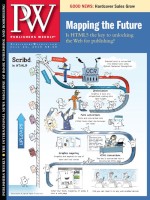While hardcover sales are holding up so far this year, the uncertain future the format faces in light of the explosive growth of e-books has thrown a new element into the agent-publisher dance, especially on high long-term advance deals. That issue came to the fore when Deadline.com reported that Janet Evanovich's agent/son, Peter, was asking her longtime house, St. Martin's Press, for $50 million for a new four-book deal. For some in the industry, the story was more of the same—yet another example of the perennial question about whether advances are too high. For others, though, the story spoke to a particularly thorny issue in today's market: most deals are still based on projections of hardcover sales, even though the e-book market is growing at such a rate that it's difficult to judge future hardcover sales on prior performance.
While SMP has since denied that Evanovich might leave and refused to talk money—a spokesperson for the house told PW that the "details were inaccurate" in the Deadline item, but declined to elaborate—one insider said the author has been pushing for more money for years and that SMP has been worried about whether it could come to terms.
Evanovich is in the top tier of bestselling authors. According to PW's sales ranking of 2009 hardcover bestsellers, Evanovich's 15th entry in the Stephanie Plum series, Finger Lickin' Fifteen, sold 977,178 copies, making it the seventh bestselling hardcover of the year. Evanovich was in good company, perched above #8, Stephenie Meyer's The Host, and below John Grisham's Ford County. Still, some observers, all of whom spoke on details about this deal on the condition of anonymity, said $50 million is too high for Evanovich. One agent estimated that to command the kind of money she was asking, she would need to sell roughly 1.25 million hardcovers.
Of course, 977,178 is fairly close to 1.25 million, so on some level the $50 million request may be reasonable. And a Forbes item, which ran shortly after the news of the deal broke, said as much—20 million Evanovich backlist titles sold last year, and she sells in the same stratosphere as people like Ken Follett, who supposedly got a $50 million three-book deal three years ago.
Evanovich might sell like Ken Follett, but that may not matter in the new publishing economics. If e-book sales do eventually cannibalize hardcover sales, publishers will lose their single greatest source of income and one they currently depend on to cover big advances.
What to do? One publisher thinks the acquisition conversation needs to change. Contracts will have to be drawn up differently and include stipulations that reflect a changing market. In the future there will be "a menu of ways to acquire a book," he noted, and contracts should contain language that reflects those variables. Royalty rates might be different based on different market conditions, for example.
Self-publishing is not considered as a particularly attractive option for bestselling authors used to large advances and the marketing, promotion, and distribution provided by publishers. Some insiders, however, think agencies may pick up the slack. And, as occurred last week, agents are quite comfortable jumping into the publishing fray. Andrew Wylie's just announced Odyssey Editions, which plans to release Kindle editions of classic books by some of the agency's bestselling authors (including Salman Rushdie and Philip Roth), has already sounded an alarm for some publishers. Random House quickly took the position that Wylie does not hold the digital rights to those titles.



 Volume 257
Issue 29
07/26/2010
Volume 257
Issue 29
07/26/2010





